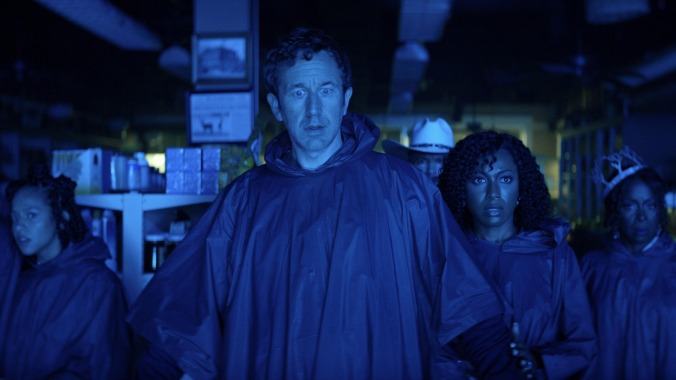The Big Door Prize review: Deep thoughts, served in punchy, half-hour doses
Chris O’Dowd stars Apple TV Plus' sci-fi dramedy, in which a magical machine prompts townspeople to reexamine their lives

“Am I reaching my full potential?” That is the question at the heart of The Big Door Prize, which premieres March 29 on Apple TV+, a series about a small-town community whose lives are upended after a mysterious machine called “Morpho,” claiming to have the ability to tell an individual’s true calling in life, appears at a general store. Although billed as a high-concept, sci-fi comedy, the series adaptation of M.O. Walsh’s novel of the same name feels more like an existentialist dramedy with more heart than humor, pondering deep, philosophical questions in punchy, half-hour installments that will leave viewers wanting more by the end of the 10-episode first season.
The show, created by Schitt’s Creek writer and executive producer David West Read, has a unique structure in that the first eight episodes, while continuing to push the overall arcs of each character forward, each focus on the “true potential” of a different resident in Deerfield, which is reflected in the clever title sequences that change in every episode. It’s a kind of character study that gives an opportunity to excavate backstories through dialogue or to relive scenes that viewers might already know about from a different perspective. In doing so, the writers are able to keep the story contained to this quaint town and foster a sense of empathy and intimacy with the residents, who are all grappling with how their dreams for their lives have compared to their reality.
Morpho’s modus operandi is simple: In exchange for payment in quarters, as well as a person’s social security number and fingerprints (eek!), the gadget will be able to distill a person’s purpose down to one or two words on a blue card. Some are self-explanatory (“guitarist,” “male model”), but others are more open to interpretation (“storyteller,” “royalty,” “superstar,” “hero”). For some, a chance encounter with Morpho is the catalyst for their decision to quit their jobs, make big purchases, end long-standing relationships, and move to a new city or country. But for others, that little card forces them to confront uncomfortable truths about the lives they’ve led.
The pilot introduces viewers to Dusty Hubbard (Chris O’Dowd), an affable and easygoing high-school history teacher who is celebrating his 40th birthday with his wife, Cass (Gabrielle Dennis), and their teenage daughter, Trina (Djouliet Amara), just as the Morpho craze begins to kick into high gear around him. When Cass gives him a theremin for his birthday (along with 39 other small gifts to represent his new age) and insists that it would be good for him to try something new, Dusty is initially confused but soon interprets the gift as a sign that his wife thinks he is boring. Having a central character undergo a midlife crisis while celebrating a milestone birthday hardly feels like a novel premise, but Dusty, who has only ever been in one romantic relationship for more than two decades and acculturated to the United States after immigrating from Ireland as a child, has grown accustomed to the rhythm and routine of his everyday life.








































